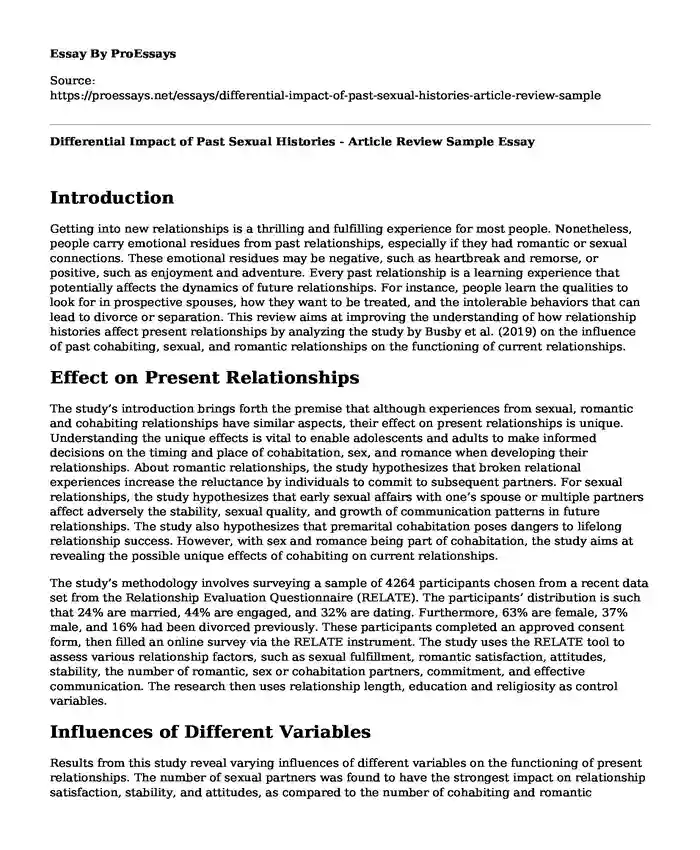Introduction
Getting into new relationships is a thrilling and fulfilling experience for most people. Nonetheless, people carry emotional residues from past relationships, especially if they had romantic or sexual connections. These emotional residues may be negative, such as heartbreak and remorse, or positive, such as enjoyment and adventure. Every past relationship is a learning experience that potentially affects the dynamics of future relationships. For instance, people learn the qualities to look for in prospective spouses, how they want to be treated, and the intolerable behaviors that can lead to divorce or separation. This review aims at improving the understanding of how relationship histories affect present relationships by analyzing the study by Busby et al. (2019) on the influence of past cohabiting, sexual, and romantic relationships on the functioning of current relationships.
Effect on Present Relationships
The study’s introduction brings forth the premise that although experiences from sexual, romantic and cohabiting relationships have similar aspects, their effect on present relationships is unique. Understanding the unique effects is vital to enable adolescents and adults to make informed decisions on the timing and place of cohabitation, sex, and romance when developing their relationships. About romantic relationships, the study hypothesizes that broken relational experiences increase the reluctance by individuals to commit to subsequent partners. For sexual relationships, the study hypothesizes that early sexual affairs with one’s spouse or multiple partners affect adversely the stability, sexual quality, and growth of communication patterns in future relationships. The study also hypothesizes that premarital cohabitation poses dangers to lifelong relationship success. However, with sex and romance being part of cohabitation, the study aims at revealing the possible unique effects of cohabiting on current relationships.
The study’s methodology involves surveying a sample of 4264 participants chosen from a recent data set from the Relationship Evaluation Questionnaire (RELATE). The participants’ distribution is such that 24% are married, 44% are engaged, and 32% are dating. Furthermore, 63% are female, 37% male, and 16% had been divorced previously. These participants completed an approved consent form, then filled an online survey via the RELATE instrument. The study uses the RELATE tool to assess various relationship factors, such as sexual fulfillment, romantic satisfaction, attitudes, stability, the number of romantic, sex or cohabitation partners, commitment, and effective communication. The research then uses relationship length, education and religiosity as control variables.
Influences of Different Variables
Results from this study reveal varying influences of different variables on the functioning of present relationships. The number of sexual partners was found to have the strongest impact on relationship satisfaction, stability, and attitudes, as compared to the number of cohabiting and romantic partners. Additionally, an increase in the number of sexual and cohabiting partners was found to reduce stability in current relationships. Conversely, the number of romantic partners did not show any distinctive impacts. The control variables had unique influences on the various relationship factors. Education had a weak impact on most factors, religiosity had a moderate effect on the number of sexual and cohabiting partners, commitment, and communication, while the relationship length affected moderately communication between partners, sexual fulfillment, and relationship satisfaction. Gender differences in the levels of influence were insignificant. However, stability, the number of sexual partners, and relationship history were considerably different between genders.
The study aimed at examining the unique impact of each relationship experience and determining if the effects differed between men and women. From the results, a shared association exists between these sexual, romantic, and cohabiting experiences that undermine the functioning of current relationships. As such, when the associations between the three experiences move together, adverse impacts, such as negative attitudes and instability threaten current relationships. Besides, negative associations are likely to overwhelm positive associations, thereby making people develop pessimistic outlooks towards relationships and undermining their ability to bond with future partners. The results also imply that people with extensive past relationship histories are more sensitive to undesirable traits about their prospective partners. The unique impact observed in the findings is that individuals with a high number of sexual and cohabiting relationships are likely to have less stable current and future relationships. This unique influence is stronger among women than men. Nonetheless, the associations of relationship attitudes and histories on the other variables are similar for women and men.
Conclusion
This analysis of the study by Busby et al. (2019) has strengthened the understanding of the unique influences of past relationship choices on present relationships. The main inference from the study is that as relationship histories become numerous and more intricate, various attitudes develop among individuals that influence the outcomes of current and future relationships. Professionals can use this knowledge to help couples build healthy relationships by identifying their undesirable attitudes gained from past experiences, then guiding them in conquering these attitudes and adopting optimistic perspectives about their current relationship. However, professionals cannot use knowledge from the study to guide homosexuals as they experience distinctive issues that potentially affect the association between their histories and relationship outcomes. Therefore, future researches should consider participants from the LGBTQ group to complement findings from this study.
References
Busby, D. M., Willoughby, B. J., & McDonald, M. L. (2019). Is it the sex, the romance, or the living together? The differential impact of past sexual, romantic, and cohabitation histories on current relationship functioning. Couple and Family Psychology: Research and Practice, 8(2), 90.
Cite this page
Differential Impact of Past Sexual Histories - Article Review Sample. (2024, Jan 01). Retrieved from https://proessays.net/essays/differential-impact-of-past-sexual-histories-article-review-sample
If you are the original author of this essay and no longer wish to have it published on the ProEssays website, please click below to request its removal:
- Research Paper on PTSD In Children
- Research Paper on Health and Mental Health Integration in Social Work
- Research Paper on Psychopathology
- Technological Device Influencing Traditional Communication Styles of Men and Women
- Freedom and Equality in Society Paper Example
- Infant Safety: Injury Prevention for Parents - Essay Sample
- Essay on Estonia Protects People With Disabilities: Challenges and Opportunities







